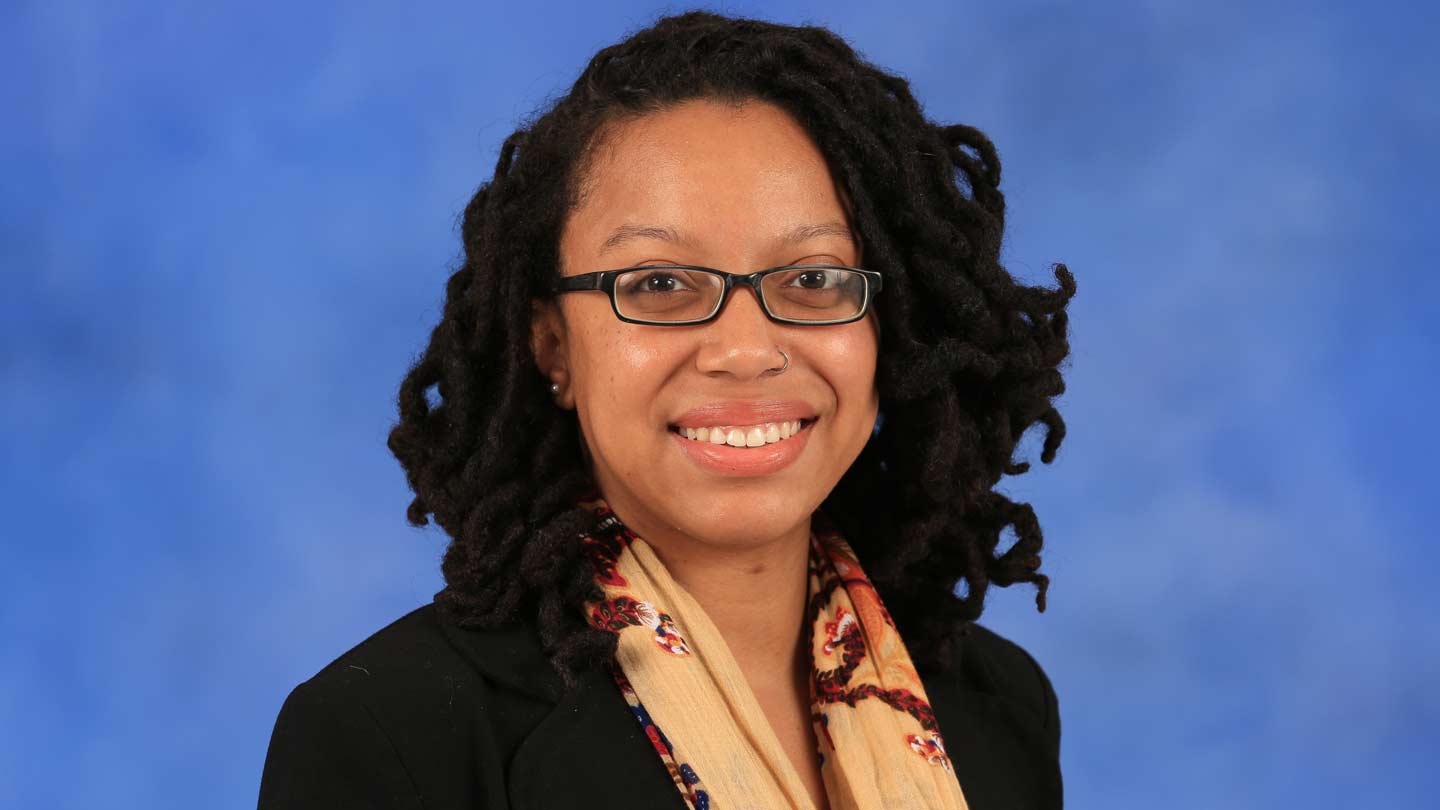
UAH graduate honor student Jasmine A. Moore is the recipient of
the prestigious Eugene Cota-Robles Fellowship at The University of California-Riverside.
Michael Mercier | UAH
Jasmine Moore’s love of the magic and majesty of words began when she was in second grade. "My love for reading began when my teacher started reading the chapter book series, "The Bailey School Kids," to us," said Jasmine A. Moore.
After hearing the stories of a group of elementary school friends who solved mysteries dealing with strange and bizarre adults, Moore started writing short ghost stories and poetry. "My love for fiction, especially speculative fiction, has grown ever since."
The Olympia Fields, IL, native graduates from The University of Alabama in Huntsville (UAH) on Sunday, May 6, with a Master’s of Arts degree in English. Moore received the English Department's award for Outstanding Thesis, titled "Sankofa: Framing Afrofuturistic Dialectical Utopias in N. K. Jemison’s The Fifth Season, Nisi Shawl’s Everfair, and Nnedi Okorafor’s Binti."
Dr. Eric D. Smith, Moore’s graduate advisor said "based on the strength" of an early draft of her thesis, the national honor student (4.0 GPA) was recently awarded the prestigious Eugene Cota-Robles Fellowship at The University of California, Riverside.
"Jasmine Moore is an exemplary thesis student: bright, ideally receptive to feedback, and highly self motivated. Most impressive is her ability to process new or unfamiliar concepts, assimilate them to her own intellectual project, and redeploy them in unexpected and insightful ways," said Smith, Professor, of English and Director of the UAH Humanities Center.
"Situated at the complex intersection of class, race, and an international sociology of form, Jasmine's thesis poses bold and immediately relevant questions for our understanding of the recent efflorescence of global science fictions and the utopian possibilities they offer. Her thesis no doubt marks the first stride in what is sure to be a stellar scholarly career as she pursues her Ph.D. at The University of California, Riverside, the premier program in the country for the study of science fiction," Smith said.
Moore’s essay is based in part on the Sankofa bird, a symbol of Ghana (West Africa) and translates to "Go back and get it." "It also comes from the proverb ‘It is not wrong for you to go back for that which you have forgotten’. The works that I examine use the past and the present of the African-diaspora to confront thoughts of the future," she said.
Moore’s thesis also explores novels and short stories written by black writers, which fall under the umbrella term of Afrofuturism, a branch of Philosophy that explores the nature of art, science and technology. Afrofuturistic works includes Marvel Comics superhero, Black Panther. The Black Panther movie is one of the top three highest-grossing films of all time.
"As a subgenre of Science Fiction (SF), I argue that these stories combine SF and Fantasy in order to navigate the tough experiences of history that descendants of Africa have undergone. I feel that this discussion is necessary for all readers since it contemplates the difficult discussions of race, sex, power, war, slavery, genocide, and the institutions that produce oppression.
"My interest is to see more work coming from black writers in the speculative fiction genre. This includes SF, Fantasy, Horror, and Suspense," said Moore. "Ultimately, I believe that I will always be invested in the fantastic stories we tell ourselves and how that shapes our future, present, and, interestingly, past."
Moore learned about UAH from her mother and oldest brother while an undergraduate honor student at historic Howard University in Washington, DC.
"I decided to start graduate work at UAH based on my family’s recommendation. They enjoyed their experiences at the university. I was very happy to have enrolled in the fall of 2014," she said.
"My UAH academic experience has been both rigorous and rewarding," Moore said. "However, I have also experienced hardship throughout my journey. I lost my mother to breast cancer at the beginning of 2016, just as I was drafting my proposal for my thesis. Dealing with grief complicated my ability to write effectively, causing me to extend my coursework.
"Throughout this period, Dr. Eric Smith has been nothing but patient and kind," said Moore. "His expert subject knowledge has helped me to navigate the tough theoretical terrain that accompanies English thesis writing while allowing me the freedom to independently explore and examine those concepts."
Moore plans to teach and write, "I think they must go hand in hand in order to stay professionally relevant." She also believes that academic knowledge — especially the Humanities, is under attack. "I recognize that the battle must be fought with more training and insight to tackle the difficult terrain of history, politics, identity, and society. English and writing provide new ways of thinking about our experiences, so I would love to join current discussions."
She has definite opinions about the Liberal Arts, and the STEM (Science, Technology, Engineering and Mathematics) disciplines, too.
"I truly believe that all majors are worthy investments when it comes to intellectual production, for which a Liberal Arts degree is designed," Moore said. "I think that the prioritization of 'job placement' based on a capitalist model discounts some majors as useless, making the Humanities the brunt of arguments about value. However, the Humanities have always had an intersectional relationship with how we use technology, and how we navigate our socioeconomic reality. If the Humanities fail, then most surely STEM will follow. Therefore, I do not see ‘sticking’ with Liberal Arts as a negotiation; it is my life’s purpose to teach, question, and explore."
Moore’s UC-Riverside fellowship covers tuition and provides a stipend as well as mentorship throughout all five years of the program.
Contact
Dr. Eric D. Smith
Professor Department of English
Director of the UAH Humanities Center
256.824.6321
eric.smith@uah.edu